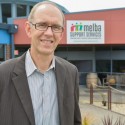By JESSE GRAHAM
WITH university and TAFE courses expected to return to Lilydale’s former Swinburne campus next year, Melba Support Services is set to work alongside the providers with a training course set to be established.
Box Hill Institute, in partnership with Deakin University and William Angliss Institute, will run courses from the campus from about February 2016.
Melba Support Services CEO Glenn Foard told the Mail that discussions were underway between the organisation and BHI to organise joint training courses through the campus.
The course could include hands-on work placement with Melba’s clients to give real-world experience, and the possibility of employment with the organisation after completion.
“That has some real benefits for just about everyone,” Mr Foard said.
“So it’s a win for students, it’s a win for the people we support because they get qualified and well-trained staff that they need, it’s a good thing for Box Hill – I think they’re really keen to run a course and to have the potential for people to be employed when they’ve completed the course.
“That’s, I think, a win for everyone and something we’re looking to advance as quickly as we can.”

He said that Melba was continuing to grow, with 300 employees supporting 360 people, over varied rosters, and that the organisation was only set to grow.
Mr Foard said moving the organisation to the campus in 2014 placed Melba and the people living with disabilities it supports, closer to the community.
“Clearly, we’re much closer to the range of community services that people need to access,” he said.
He said having the organisation visible in the community would help to break down negative misconceptions or stigmas about people living with disability.
“There was a time, and we’re going back a couple of decades or more, where the general community view of people with disabilities was, you know, they go into an institution and they kind of live there and they’re out of sight and they’re out of mind,” Mr Foard sad.
“Clearly, that’s not the view we hold and more and more, that’s not the view of the community.
“The view we have is that people need to be engaged in the community they live in, and participate the same way that any other member of the community might participate.”
Mr Foard said that discussions were continuing about a potential training course through the campus’s new education providers, but that the plan was to get one established “as soon as possible”.







